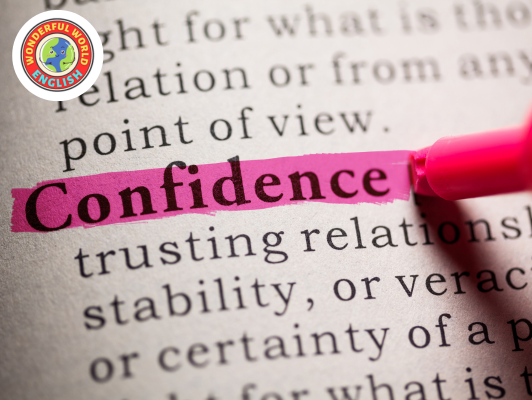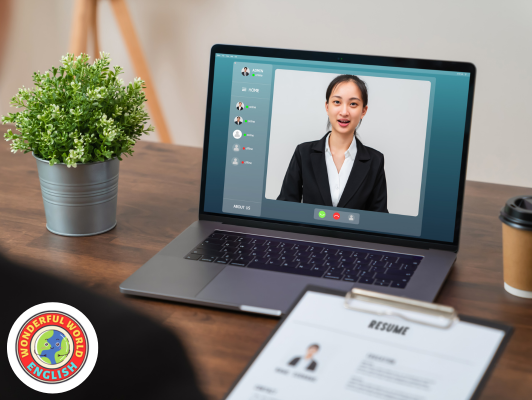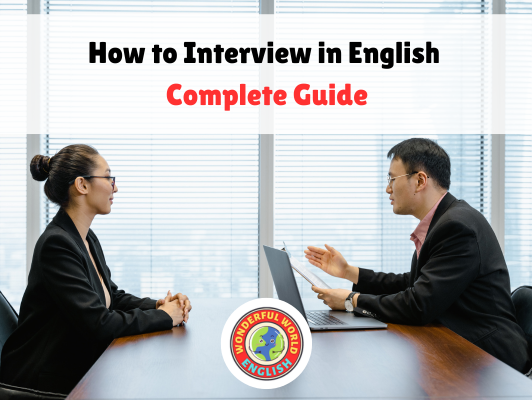Contents
Toggle
Meet David De’ Ath, founder, editor, and writer at Wonderful World English. With his extensive background as an English teacher, David provides valuable insights and practical tips on ESL for students and teachers alike.
Getting ready for a job interview in English can be daunting, especially if it’s not your first language.
Nonetheless, it’s a crucial step in securing a job in an English-speaking environment.
Preparation is key. Equip yourself with a notebook and pen to jot down important notes during this learning journey.
Translating these notes into your native language alongside English can enhance clarity and reinforce your understanding, depending on your proficiency level.
Navigating through the world of job interviews involves understanding different types and formats.
Whether it’s an in-person meeting, a video call, or a group situation, each has its own nuances.
Remember to present yourself professionally—dressing appropriately and maintaining good body language are just as important as what you say.
Knowing the dos and don’ts can be the difference between making a positive impression or not.
Familiarizing yourself with common interview questions and practicing your responses can bolster your confidence, giving you a better chance to showcase why you’re the right fit for the job.
Key Takeaways
- Preparation and note-taking enhance understanding of job interviews.
- Professional presentation and body language are crucial in making a good impression.
- Practicing responses to common questions builds confidence for the interview.
Getting Ready for Job Interviews
Advice on Making Notes
Note-taking is crucial for understanding and retaining information about job interviews.
Keeping a record helps ensure you can revisit and comprehend the materials better.
It’s beneficial to jot down important points using a mix of English and your own language, especially if your mastery of English is still developing.
This strategy aids in clarifying the concepts you’re trying to grasp.
Choose the tools that suit you best, whether it’s a simple notebook or a digital note app.
Strategy for Notes in Two Languages
When it comes to making notes for a job interview, using both English and your native tongue can be incredibly helpful.
This dual-language approach can help ensure complete clarity on the subjects you’re documenting.
The level of English fluency varies among individuals, so tailoring this strategy to fit your current language proficiency is key.
This method allows you to compare and firmly establish the meaning in both languages, reinforcing your understanding and preparation for the interview.
Interview Dos and Don’ts
When attending an interview, remember to dress appropriately and maintain eye contact; this displays confidence.
Project a confident tone of voice and practice courtesy, with polite smiles, which is essential for a positive impression.
Sitting upright during video interviews shows professionalism.
Lastly, avoid any non-professional behavior, like sticking out your tongue or dressing too casually, as it can harm your prospects of landing the job.
Mastering Interview Vocabulary
Familiarize yourself with essential interview vocabulary, starting with ‘applicant’, which refers to the job seeker.
Know the difference between ‘resume’ and ‘CV’, and the importance of having a ‘cover letter’ tailored to the job you desire.
Understand terms like ‘position’, ‘experience’, ‘skills’, ‘qualifications’, ‘strengths’, ‘weaknesses’, ‘responsibilities’, and ‘achievements’ as these reflect your background and what you can bring to the company.
Proper usage of these terms can leave a strong impression on your potential employers.

Grasping the Essentials of Job Interviews
The Significance of Preparing for Job Interviews
Preparing for a job interview is critical to making a good impression and increasing one’s chances of being hired.
When individuals anticipate the questions and plan their responses, they demonstrate readiness and confidence, which can be a decisive factor during the hiring process.
- Do: Equip oneself with responses to likely interview questions.
- Don’t: Attend unprepared, risking anxiety and poor performance.
Expecting Routine Inquiries During Interviews
A well-prepared job seeker should expect to answer typical questions in an interview.
By understanding these frequently asked questions, one can prepare thoughtful responses that present their qualifications effectively.
- Do: Familiarize oneself with common interview questions.
- Don’t: Let standard queries catch one by surprise.
Crafting Responses
It’s essential to structure answers in a way that clearly communicates one’s suitability for the position.
A structured response also portrays confidence and a clear understanding of the job role and one’s own experiences.
- Do: Organize answers into coherent and impactful statements.
- Don’t: Offer disjointed or vague responses.
Refining Language and Terms Usage
Mastering key phrases and industry-specific vocabulary can make a significant difference.
It showcases a candidate’s proficiency in language and understanding of the field.
- Do: Practice and integrate relevant terminology into one’s language.
- Don’t: Overlook the importance of job-specific vocabulary.
Building Self-Assurance
Confidence can be the defining aspect of any job interview performance.
Through practice and preparation, individuals can boost their self-confidence, reducing nervousness.
- Do: Engage in activities and preparations that enhance self-reliance.
- Don’t: Disregard the influence of self-assurance on interview outcomes.

Different Kinds of Interview Settings
Face-to-Face Interviews
When a job seeker goes directly to the employer’s location to meet and talk with a hiring manager, it’s considered a face-to-face interview.
In such settings, it’s essential to dress appropriately and maintain good eye contact without staring, which can demonstrate confidence.
Maintaining an upright posture can also make a positive impression.
Interviews Over Video Call
With people spread across various regions, video call interviews have become more common.
Platforms like Zoom, Skype, or Google Meets are often used for this purpose.
The key here is to treat the video interview similarly to an in-person interview by dressing professionally, sitting up straight, and looking directly into the camera to simulate eye contact.
Interviews with Multiple Interviewers
An interview with several interviewers is often termed a panel or group interview.
This can occur either face-to-face or via video. Engaging with multiple people means one may need to address different questions from each interviewer.
It’s important to interact with all interviewers by making eye contact and listening closely to each question asked.

Interview Guidelines
Dressing Suitably for Interviews
Wear professional attire that fits the job environment.
Avoid casual clothes like the ones shown in the video that may come across as unprofessional and harm first impressions.
Maintaining Professional Posture and Gestures
Pay attention to posture when seated or standing during an interview. Sit upright and maintain an open stance to demonstrate attentiveness and respect.
Avoid slouching or casual behaviors such as sticking out the tongue.
Eye Contact During Conversations
Lock eyes with the interviewer to exhibit confidence.
Do not stare intensely as it can be off-putting.
Instead, use natural eye contact to engage with the interviewer, showing active listening and sincerity.
Expressing Assurance both Verbally and Through Body Language
Speak with a clear and assertive voice to convey certainty in one’s abilities.
Combine this with affirmative body language, like nodding and smiling, to reinforce self-assuredness without uttering a word.
Being Courteous and Demonstrating a Constructive Outlook
Politeness goes a long way: always be cordial and present a smile.
A cheerful demeanor reflects positivity and willingness to collaborate, which are attractive qualities in any job candidate.

Essential Terms for Job Interviews
The Job Seeker
This is the individual who is applying for an employment opportunity.
Professional Profile Summary
This document encapsulates an individual’s employment background, scholastic achievements, and competencies.
It is known as a “resume” in American English and “CV” (Curriculum Vitae) in British English.
Application Introduction Letter
An accompanying message provided with the professional profile summary to delineate the candidate’s suitability for the desired role.
Employment Role
Refers to the specific title or function that an applicant is seeking within a company.
Work History
Encompasses the accumulated array of jobs and duties an individual has previously held.
Abilities
Refers to the specific set of capabilities or areas of expertise a candidate possesses.
Educational and Professional Credentials
These include the various certifications, degrees, or formal recognitions that validate an individual’s aptitude for a role.
Personal Advantages
These are the unique attributes or competencies that an individual brings to a position, distinguishing them as a strong candidate.
Areas for Growth
These are the personal traits or skills where an individual may benefit from further development or improvement.
Obligations of the Role
Denotes the set of tasks and duties associated with a specific job.
Notable Successes
Individual accomplishments or milestones achieved in one’s career or job performance.
We hope you have found value in this guide; feel free to reach out if you are in need of any assistance.
Have a wonderful day!
Image Attribution: All images licensed via canva.com





